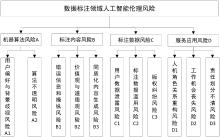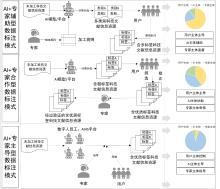
农业图书情报学报 ›› 2024, Vol. 36 ›› Issue (9): 18-31.doi: 10.13998/j.cnki.issn1002-1248.24-0640
• AI数据体系建设专题 • 下一篇
AI+专家驱动的科技文献信息资源消费端数据体系建设研究
叶光辉, 涂凯, 胡丽娜, 韩丽, 冯智敏
- 华中师范大学 信息管理学院,武汉 430079
-
收稿日期:2024-07-01出版日期:2024-09-05发布日期:2025-01-13 -
作者简介:叶光辉(1986- ),硕士生导师,副教授,博士,研究方向为信息融合、信息检索
涂凯(2002- ),硕士研究生,研究方向为科学计量与用户信息行为
胡丽娜(2002- ),硕士研究生,研究方向为数据挖掘
韩丽(2001- ),硕士研究生,研究方向为数据挖掘
冯智敏(2002- ),硕士研究生,研究方向为数据挖掘
-
基金资助:教育部人文社会科学项目“面向共景治理的突发事件舆情演化计算与决策耦合模型研究”(23YJC870011)
Building Consumption Data Systems Driven by AI Plus Expert for Scientific and Technical Literature Information Resources
Guanghui YE, Kai TU, Lina HU, Li HAN, Zhiming FENG
- School of information management, Central China Normal University, Wuhan 430079
-
Received:2024-07-01Online:2024-09-05Published:2025-01-13
摘要:
[目的/意义] 受限于传统文献分类体系局限,用户产生的高价值消费端标注数据还不能作为数据要素融入科技文献服务,致使科技文献服务无法顺应开放科学时代背景与满足用户读者各类知识需求。本研究旨在挖掘AI提供技术突破潜力,构建AI+专家驱动的科技文献信息资源消费端数据体系,以期推动科技文献服务优化进程。 [方法/过程] 首先分析了科技文献信息资源消费端数据体系建设价值表征,然后提出了科技文献信息资源消费端数据体系建设原则,再者解构与剖析了AI介入科技文献信息资源消费端数据体系建设风险。最后,根据AI介入数据标注工作的程度,设计了3种AI+专家协同用户科技文献信息资源数据标注创新模式。 [结果/结论] 聚焦于引领用户协同完成数据标注工作,AI+专家辅助型数据标注模式下,AI充当工具角色根据专家制定处理规则完成表层信息处理,协助用户完成数据标注;AI+专家合作型数据标注模式下,AI完成科技文献预标注标签审查工作,用户从自生成标签模式转变为评判与挑选AI生成的数据标签模式,专家辅助审核最终数据标签质量;AI+专家主导型数据标注模式下,用户提供数据标注需求,专家进行过程操作指导,数据标注由AI4S平台自动化完成。
中图分类号: G251
引用本文
叶光辉, 涂凯, 胡丽娜, 韩丽, 冯智敏. AI+专家驱动的科技文献信息资源消费端数据体系建设研究[J]. 农业图书情报学报, 2024, 36(9): 18-31.
Guanghui YE, Kai TU, Lina HU, Li HAN, Zhiming FENG. Building Consumption Data Systems Driven by AI Plus Expert for Scientific and Technical Literature Information Resources[J]. Journal of Library and Information Science in Agriculture, 2024, 36(9): 18-31.
| 1 |
韩彻驹, 张向前. 中国构建世界重要人才中心和创新高地的风险研究[J]. 科学管理研究, 2024, 42(3): 136-143.
|
|
|
|
| 2 |
黄珂敏, 郑颖, 曲建升, 等. 学术虚拟社区中热点主题识别及其趋势预测方法框架研究[J/OL]. 情报科学, 2024: 1-16.
|
|
|
|
| 3 |
白荔, 俞紫梅. 传统分类法在网络环境下的发展探析[J]. 科技情报开发与经济, 2015(19): 1-3.
|
|
|
|
| 4 |
叶光辉, 祁宁杰, 唐明月, 等. 科技文献信息资源“生产-出版-消费” 价值链分析[J]. 情报理论与实践, 2022, 45(3): 110-117.
|
|
|
|
| 5 |
杜秀杰, 葛赵青, 卓选鹏, 等. 数字出版时代学术论文的互动评价探索[J]. 编辑学报, 2014, 26(1): 10-12.
|
|
|
|
| 6 |
夏立新, 龙存钰, 胡畔, 等. 基于查询意图的细粒度图书分面检索研究[J]. 图书情报工作, 2024, 68(8): 122-132.
|
|
|
|
| 7 |
张嘉翔, 潘敏, 张瑞. 基于自监督图网络的脑电情绪识别方法研究[J/OL]. 计算机科学, 2024: 1-9.
|
|
|
|
| 8 |
孙岩, 周立新, 孙连君, 等. 知识图谱和大语言模型在航天测控问答系统中的融合应用研究[J]. 上海航天(中英文), 2024, 41(5): 178-184.
|
|
|
|
| 9 |
李玥, 洪海蓝, 李文林, 等. 大语言模型构建鼻炎医案知识图谱中的应用研究[J/OL]. 计算机工程与应用, 2024: 1-11.
|
|
|
|
| 10 |
张超, 韩虓, 王芳. ChatGPT与知识生产和复用: 赋能、挑战与治理[J]. 图书与情报, 2023(3): 52-60.
|
|
|
|
| 11 |
|
| 12 |
|
| 13 |
|
| 14 |
王正超. AIGC介入科研知识生产: 风险表征、逻辑解构与责任重构[J/OL]. 情报资料工作, 2024: 1-13.
|
|
|
|
| 15 |
SCI-FI magazine overwhelmed by hundreds of AI-generated stories[EB/OL]. [2024-05-22].
|
| 16 |
朱武信, 夏翠娟, 吴建伟. 面向全流程管理的专家协同知识生产系统设计与实现——以家谱联合编目系统为例[J]. 图书馆杂志, 2024, 43(8): 4-12, 33.
|
|
|
|
| 17 |
杨逐原. 社交化阅读时代知识生产与服务形态的变迁[J]. 新闻知识, 2022(5): 11-15.
|
|
|
|
| 18 |
戚德祥, 王佳康. 价值链重构: 数字出版国际传播效能提升策略[J]. 中国编辑, 2024(10): 20-26.
|
|
|
|
| 19 |
丛挺, 奚心远. 数据要素驱动出版服务创新研究——基于《“数据要素×”三年行动计划(2024—2026年)》分析[J]. 中国编辑, 2024(8): 82-88.
|
|
|
|
| 20 |
陈铭. 开放科学背景下的数据出版: 功能、困境与治理进路[J]. 科技与出版, 2024(10): 80-88.
|
|
|
|
| 21 |
|
| 22 |
实验室简介-语义出版与知识服务重点实验室[EB/OL]. [2024-05-10].
|
| 23 |
刘岩. 基于知识消费理念的图书馆知识服务管理模式研究[J]. 科技风, 2020(1): 237-238.
|
|
|
|
| 24 |
梁春启, 赵晓明. 数字时代分享经济环境下知识付费定价研究——基于知乎平台数据的算例分析[J/OL]. 价格理论与实践, 2024: 1-5.
|
|
|
|
| 25 |
郭宇, 王晰巍, 杨梦晴. 网络社群知识消费用户体验评价研究——基于扎根理论和BP神经网络的分析[J]. 情报理论与实践, 2018, 41(3): 117-122, 141.
|
|
|
|
| 26 |
|
| 27 |
陆伟, 刘寅鹏, 石湘, 等. 大模型驱动的学术文本挖掘——推理端指令策略构建及能力评测[J]. 情报学报, 2024, 43(8): 946-959.
|
|
|
|
| 28 |
|
| 29 |
科技文献大模型2.0发布暨科技文献内容智能分析与应用学术研讨会在合肥成功举办 [EB/OL]. [2024-06-10].
|
| 30 |
|
| 31 |
|
| 32 |
陈博立, 鲜国建, 赵瑞雪, 等. 科技文献问答式智能检索总体设计与关键技术探析[J]. 中国图书馆学报, 2023, 49(3): 92-106.
|
|
|
|
| 33 |
|
| 34 |
钱力, 刘细文, 张智雄, 等. AI+智慧知识服务生态体系研究设计与应用实践——以中国科学院文献情报中心智慧服务平台建设为例[J]. 图书情报工作, 2021, 65(15): 78-90.
|
|
|
|
| 35 |
杜宝贵, 丰佰恒. 科学数据要素交易助力新质生产力实现: 机理、困境与破局[J/OL]. 现代情报, 2024: 1-13.
|
|
|
|
| 36 |
周江林. AI4S对我国高校基础研究的影响机理及实践边界[J]. 教育发展研究, 2023, 43(21): 31-38.
|
|
|
|
| 37 |
王秀慧, 赵治军. 基于用户偏好行为数据的数字图书馆资源推荐方法研究[J]. 软件, 2022, 43(5): 8-12, 45.
|
|
|
|
| 38 |
王元新, 邵亚伟, 黄金霞. 开放科学时代下的可复现性危机与机遇[J/OL]. 科学学研究, 2024: 1-18.
|
|
|
|
| 39 |
张立, 王扬, 李梦竹, 等. 对近年来数字出版评优产品的追踪测评及分析(Ⅶ)——传统出版单位数字出版产品综合分析报告[J]. 科技与出版, 2024(10): 36-50.
|
|
|
|
| 40 |
孙坦, 张智雄, 周力虹, 等. 人工智能驱动的第五科研范式(AI4S)变革与观察[J]. 农业图书情报学报, 2023, 35(10): 4-32.
|
|
|
|
| 41 |
马费成, 王淳洋. 数字产业化的理论逻辑与实践路径[J/OL]. 信息资源管理学报, 2024: 1-13.
|
|
|
|
| 42 |
唐欣, 许永斌. 数字产业化与产业数字化耦合赋能城市高质量发展的实证检验[J]. 统计与决策, 2023, 39(20): 104-108.
|
|
|
|
| 43 |
柴国荣, 高旭, 周福洲. 基于界面集成的供应链全生命周期风险预警模式研究[J]. 科技进步与对策, 2009, 26(2): 23-26.
|
|
|
|
| 44 |
|
| 45 |
王旭, 程光辉, 赵鸿玉, 等. 技术性压力视角下智慧图书馆人工智能风险防控体系研究[J]. 图书馆学研究, 2024(7): 56-69.
|
|
|
|
| 46 |
王佑镁, 王欣颖, 柳晨晨. 教育领域生成式人工智能应用的伦理风险管理框架研究[J]. 电化教育研究, 2024, 45(10): 28-34, 42.
|
|
|
|
| 47 |
The 15 biggest risks of artificial intelligence[EB/OL]. [2024-07-06].
|
| 48 |
AI risk management framework[EB/OL]. [2024-07-09].
|
| 49 |
徐暾. 电子数据保管链制度的价值基础及其建构进路[J]. 湖南社会科学, 2023(4): 121-131.
|
|
|
|
| 50 |
杨垠红. 加强算法风险侵权法律规制[EB/OL]. [2024-07-09].
|
| 51 |
ChatGPT and large language model bias[EB/OL]. [2024-07-17].
|
| 52 |
江必新, 王鑫. 数字行政行为算法歧视的法律规制[J/OL]. 学术论坛, 2024: 1-15.
|
|
|
|
| 53 |
王飞跃, 缪青海. 人工智能驱动的科学研究新范式: 从AI4S到智能科学[J]. 中国科学院院刊, 2023, 38(4): 536-540.
|
|
|
|
| 54 |
张佳欣. AI“模型崩溃”风险需警惕[N]. 科技日报, 2024-09-25(004).
|
| 55 |
AI homogenization is shaping the world[EB/OL]. [2024-07-17].
|
| 56 |
Does ChatGPT violate New York Times' copyrights?[EB/OL]. [2024-07-17].
|
| 57 |
王俊, 谢青伶, 刘畅. 日常生活情境下用户与生成式人工智能交互行为分析[J/OL]. 图书情报知识, 2024: 1-11.
|
|
|
|
| 58 |
王飞跃, 缪青海. 平行科学: 大模型时代AI4S的前沿技术与框架体系[J]. 人民论坛·学术前沿, 2024(14): 64-79.
|
|
|
|
| 59 |
孙战彪, 付长友, 张红军. 全媒体出版趋势下第三代图书馆泛在服务研究[J]. 图书馆工作与研究, 2018(12): 5-12.
|
|
|
|
| 60 |
|
| 61 |
钱力, 刘志博, 胡懋地, 等. AI就绪的科技情报数据资源建设模式研究[J]. 农业图书情报学报, 2024, 36(3): 32-45.
|
|
|
|
| 62 |
李蕾, 刘钊, 王栩彦. 用户体验视角下ChatGPT辅助信息检索的可用性研究[J/OL]. 情报理论与实践, 2024: 1-12.
|
|
|
|
| 63 |
|
| 64 |
|
| 65 |
秦雪冰, 郭博. 智能广告文案的消费者参与度研究——基于汽车之家APP的实证检验[J]. 新闻与传播研究, 2022, 29(6): 56-72, 127.
|
|
|
|
| 66 |
闫乃之. 情智兼备的媒介平台人机交互演进与价值边界拓展[J]. 陕西师范大学学报(哲学社会科学版), 2024, 53(5): 103-117.
|
|
|
|
| 67 |
朱禹, 叶继元, 贾毓洁. 图书馆学的人工智能生成内容(AIGC): 概念框架与研究进路[J/OL]. 图书馆论坛, 2024: 1-10.
|
|
|
|
| 68 |
张慧, 石肖肖. AIGC在高校图书馆智慧服务中的应用探索[J]. 图书馆学刊, 2024, 46(9): 58-62, 67.
|
|
|
|
| 69 |
刘昊坦, 刘家伟, 张帆, 等. 科技文献的多层次结构功能识别[J]. 信息资源管理学报, 2024, 14(3): 90-103.
|
|
|
|
| 70 |
姜鹏, 任龑, 朱蓓琳. 大语言模型在分类标引工作中的应用探索[J]. 农业图书情报学报, 2024, 36(5): 32-42.
|
|
|
|
| 71 |
王飞跃, 王雨桐. 数字科学家与平行科学: AI4S和S4AI的本源与目标[J]. 中国科学院院刊, 2024, 39(1): 27-33.
|
|
|
|
| 72 |
崔小燕, 张长立. 生成式人工智能诱发的风险样态、生成逻辑与智慧治理策略——基于传播政治经济学的分析[J]. 宁夏社会科学, 2023(4): 188-198.
|
|
|
|
| 73 |
吴文璟, 唐博文, 李艳. 数字时代孤独的概念演变与表现方式[J]. 传媒论坛, 2024, 7(11): 30-32, 56.
|
|
|
|
| 74 |
刘瑀钒. 从技术依赖到平台隔离: 数字时代青年群体孤独感的形成[J]. 吉首大学学报(社会科学版), 2024, 45(5): 110-121.
|
|
|
| [1] | 刘琼, 刘星, 刘桂锋. “人工智能+高等教育”应用场景下的AI素养框架研究[J]. 农业图书情报学报, 2024, 36(8): 43-55. |
| [2] | 王树义, 曾雯, 张为师, 李俊洁. 知识工作者AI素养差距的AI技术弥补手段研究[J]. 农业图书情报学报, 2024, 36(8): 20-33. |
| [3] | 马海婷, 程川生. 图书馆AI聊天机器人持续使用意愿研究——基于情感体验的中介[J]. 农业图书情报学报, 2024, 36(6): 34-49. |
| [4] | 姚丽琴, 张海. AIGC用户中辍行为影响因素模型构建与实证研究[J]. 农业图书情报学报, 2024, 36(5): 79-92. |
| [5] | 罗国锋, 刘清生. ChatGPT赋能高校信息素养教育应用场景与实践研究[J]. 农业图书情报学报, 2024, 36(4): 91-101. |
| [6] | 钱力, 刘志博, 胡懋地, 常志军. AI就绪的科技情报数据资源建设模式研究[J]. 农业图书情报学报, 2024, 36(3): 32-45. |
| [7] | 邹娅一. ChatGPT赋能图书馆智慧服务:机遇、挑战与发展策略[J]. 农业图书情报学报, 2024, 36(2): 71-80. |
| [8] | 孙俐丽, 王伟杰, 盛杰霏. 科学数据价值增值影响因素系统动力学仿真研究[J]. 农业图书情报学报, 2023, 35(9): 28-42. |
| [9] | 张嘉宁, 宋西贵. ChatGPT与图书馆的领域动向[J]. 农业图书情报学报, 2023, 35(8): 19-29. |
| [10] | 符荣鑫, 杨小华. AIGC语言模型分析及其高校图书馆应用场景研究[J]. 农业图书情报学报, 2023, 35(7): 27-38. |
| [11] | 马乐存, 詹希旎, 朱齐宇, 孙榕, 李白杨. AIGC驱动的GLAM数智融合创新发展研究[J]. 农业图书情报学报, 2023, 35(5): 4-15. |
| [12] | 寿建琪. 走向“已知之未知”:GPT大语言模型助力实现以人为本的信息检索[J]. 农业图书情报学报, 2023, 35(5): 16-26. |
| [13] | 吕瑞娟, 张静蓓, 严丹, 蔡迎春. AIGC与GLAM创新发展综述——基于“生成未来·AIGC与GLAM创新发展”前沿学术论坛[J]. 农业图书情报学报, 2023, 35(5): 27-36. |
| [14] | 李鹏, 宋西贵. AIGC技术赋能图书馆阅读推广工作的创新应用[J]. 农业图书情报学报, 2023, 35(12): 84-93. |
| [15] | 孙坦, 张智雄, 周力虹, 王东波, 张海, 李白杨, 勇素华, 左旺孟, 杨光磊. 人工智能驱动的第五科研范式(AI4S)变革与观察[J]. 农业图书情报学报, 2023, 35(10): 4-32. |
|
||







